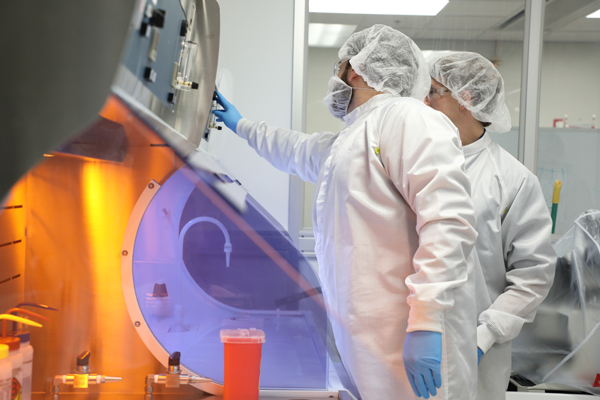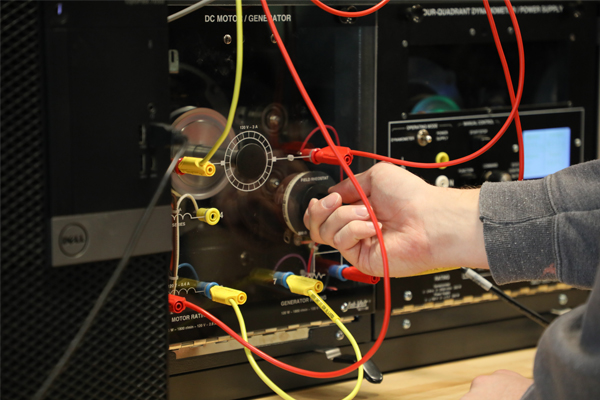
Metallurgical and Materials Engineering, B.S.
Learn how to process ores, separate valuable minerals into concentrates, produce and purify metals, manufacture metals into products, create materials, and join materials together.
Why Study Metallurgical and Materials Engineering?
The survival and continued advancement of modern society and security depend on the development of new technologies and the availability of materials. With a degree in metallurgical and materials engineering, our graduates enter the workforce prepared to make an immediate impact in areas such as sustainable development and utilization of natural resources, national defense, and the development of advanced materials.
What Type of Skills Do You Need?
You’ll need to be inquisitive and want to know how things work. If you are hard-working and love to be challenged, the Metallurgical and Materials Engineering program could be a good fit for you. Skills in oral and written communication, aptitude for math and physics, and a love of applied chemistry are also good skillsets to have for this program.
Hands-On, Experiential Learning
Metallurgical and Materials Engineering students learn the wonders of innovation and how materials can be manipulated to meet modern demand through a series of labs. As one of Montana Tech’s lab-based “heritage programs,” students reinforce theoretical concepts through “hands-on” experiential learning in laboratories that emphasize practical, industry-based exercises.
High-Demand Career Field
Job opportunities are available in a variety of industries where minerals, metals and materials are produced and consumed. These industries include but are not limited to mining, manufacturing, petroleum, iron/steel making, automotive, recycling, chemicals, paper/pulp, aerospace, maintenance, corrosion, forensics, and more.
Internships
Internship opportunities can make college a debt-free investment!
Most of our undergraduate and non-thesis graduate students obtain summer internships or six-month co-ops that help with college expenses while providing valuable experience that will make the students more marketable upon graduation.
The Center for Advanced Materials Processing (CAMP) offers paid and unpaid internships during the school year.
Industry Growth
According to the U.S. Bureau of Labor Statistics, the median annual salary for Materials Engineers in 2021 was approximately $102,000. Industrial demand for Materials Engineers currently is exceptionally strong and is anticipated to substantially increase over the next decade due to the shift from fossil fuel based energy to materials-based renewable energy, the need to revitalize the domestic extractive industries, and growing demand for advanced biomaterials and electronic materials.
Research in Center for Advanced Materials Processing (CAMP)
The Center for Advanced Materials Processing (CAMP) is a Montana University System designated Center of Excellence in Research and Education. CAMP is home to an analytical testing laboratory and materials testing laboratory. It also provides management services for large, multiple-project research programs.
Three Minors Available
Enhance your industrial employment and career opportunities by minoring in Materials Science, Extractive Metallurgy, or Mineral Processing.
What is Metallurgical and Materials Engineering?
At Montana Tech, Metallurgical and Materials Engineering is a hybrid Bachelor of Science program that encompasses and integrates all essential aspects of materials science and process engineering.
What Kinds of Jobs Do Metallurgical and Materials Engineers Get?
This is a field with endless career possibilities and earning potential. Job opportunities are available in a variety of industries where minerals, metals, and materials are produced and consumed.
Offering a B.S. in Metallurgical Engineering, Emphasizing Extractive Metallurgy & Mineral Processing Engineering.
Explore Classes in Metallurgical and Materials Engineering
Metallurgical and Materials Engineering encompasses five disciplines in minerals, metals and materials processing and manufacturing: Mineral Processing, Extractive Metallurgy, Physical Metallurgy, Materials Science, and Joining/Welding Metallurgy.
Meet faculty, explore our research expertise, and more.
The B.S. in Metallurgical and Materials Engineering is accredited by ABET.
Get semester-by-semester info about metallurgical and materials engineering courses.

Learn to design and build machines from small devices to spacecraft and prepare for an in-demand, high-pay career.

Focus on pollution prevention, sustainability, water and air quality, waste water treatment, and land and soil restoration.

Go further with advanced study of energy and power, automation and controls, signal processing, and instrumentation.
We can answer your questions and help you get started.
Goldcorp Professor of Extractive Metallurgy Campus Director
jdowney@mtech.edu
406-496-4578